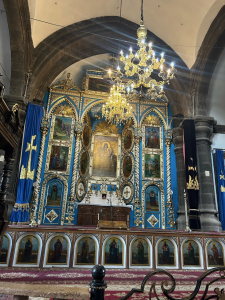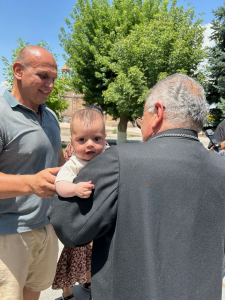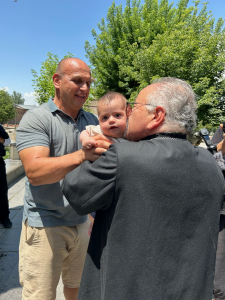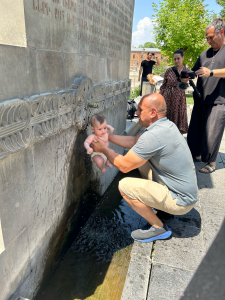Gyurmi – DNA returns
Roots of Armodoxy: Memory in DNA
“She remembered the railroad tracks and the mountains.”
During the Armenian Genocide 1.5 Million Armenians were brutally slaughtered and a greater number of Armenians were exiled from their historic homeland creating the Armenian Diaspora, with representation in almost every country on earth. When a member of that diaspora visits Armenia for the first time, Armenian DNA returns to the land after a century in exile.
A dear friend recently made a pilgrimage with us to Armenia. She came with a story of a memory. Her mother’s mother was from Gyumri and remembered two distinct images from the landscape, the railroad tracks and the mountains.
A child’s vantage point is skewed. From a small stature always looking up at adults and the world, the world seems different than when, as an adult, standing 6 feet off the ground, the same scenery and objects are viewed. And so, in Gyumri we searched, viewing as a child, compensating for the parallax view and invoking images in our mind’s eye from a century before. We searched for what may have been the spot where this child’s memory focused on the railroad tracks that reached for the horizon only to find the mountain. And there it was! Tracks and a mountain.
The mind has a way of protecting itself from huge traumatic events. It will compartmentalize the memories of the Genocide and images from the mass exodus, but it will remember, and quite vividly, those things which are precious and give definition to life. They are the sacred spaces of our lives. The train tracks were a connection to home. The mountain range was home. Over a hundred years later, the DNA and the memories embedded within its double helix returned from where it was taken.
In the Gospel according to St. Luke (2:42-48) we read, that when Jesus was twelve years old, on a trip to Jerusalem with Joseph and Mary, “he lingered behind.” Joseph and Mary searched for three days and found Him in the temple, ‘sitting in the midst of the teachers, both listening to them and asking them questions. And all who heard Him were astonished at His understanding and answers. So when they saw Him, they were amazed; and His mother said to Him, “Son, why have You done this to us? Look, Your father and I have sought You anxiously.” And Jesus said to them, “Why did you seek Me? Did you not know that I must be about My Father’s house?” ‘
Some memories honor the past. Others celebrate them while still others hinder us from moving forward. In Gyumri we found these memories and we returned one as well, one which identified this land as sacred and holy, as the place where life began.
Armodoxy asks us to look at land not as possessions but as sacred spaces that define and give meaning to life. They are created by the holy memories that we hold in our heart. War becomes obsolete because the goal is not to acquire more land but to celebrate the sacredness that belongs to us all.
We pray, “I beseech You, Living God, through Your divine blessings and pleasing graces, enlighten my mind and allow me to love You with all my heart, and through Your irrefutable might, lead me on the path of your will and Your commandments. You are my hope and refuge. You are my salvation. Amen.”







